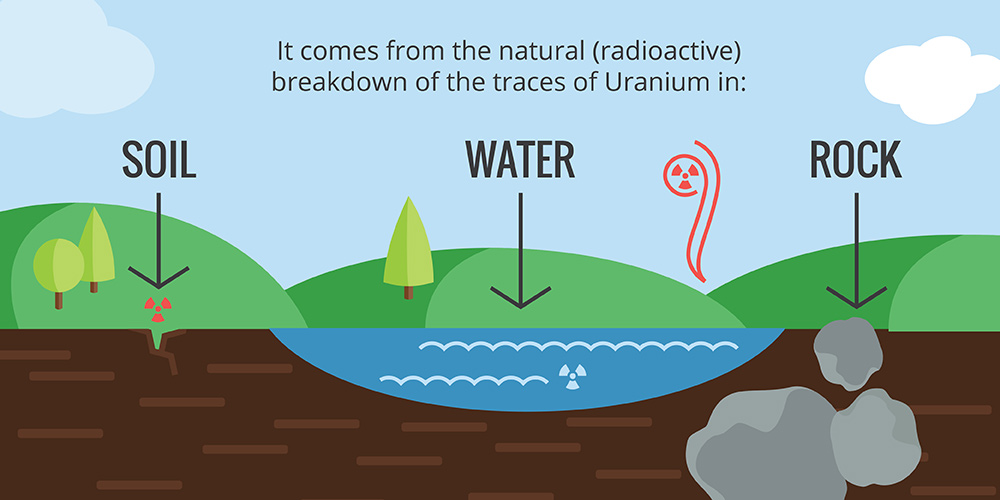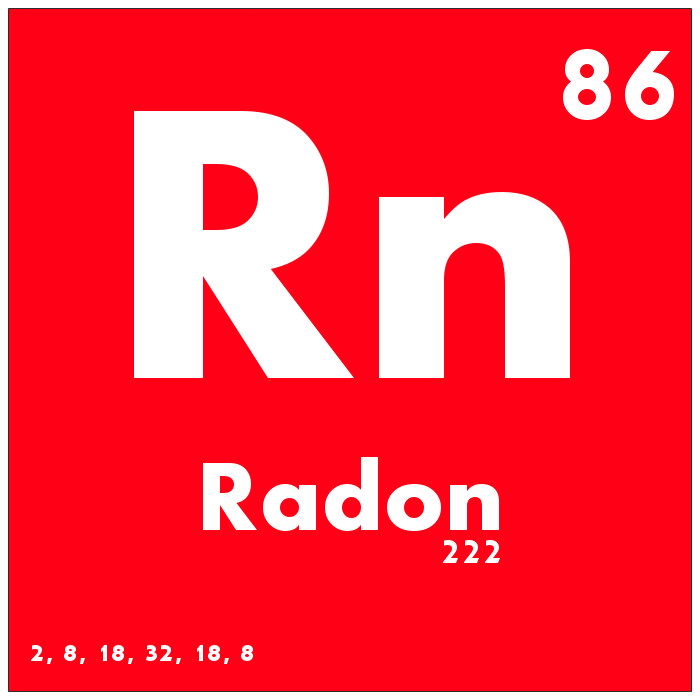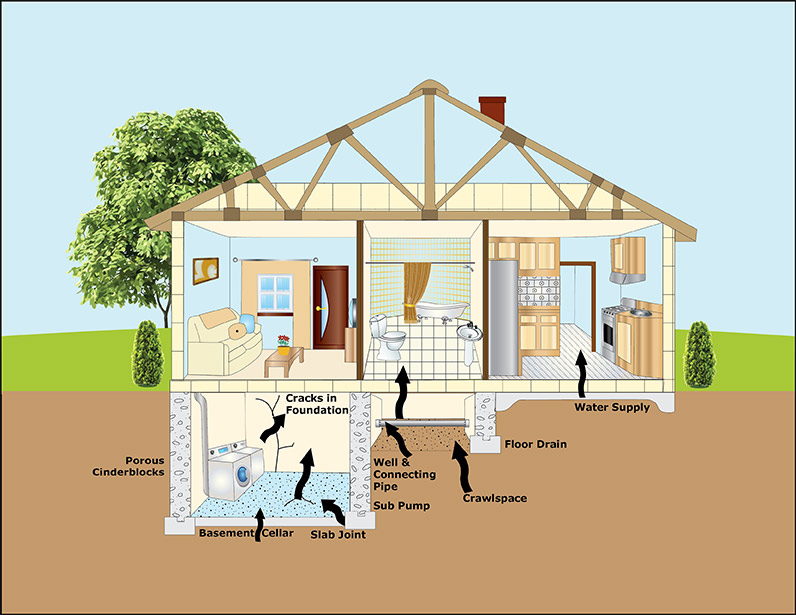
Dear Eartha,
Some of my neighbors have tested for radon in their homes and are now working to remedy issues they have found. What should I know about radon, and when should I take action?
Stacy, Breckenridge
 The first thing to know about radon is that it’s a carcinogenic gas, responsible for roughly 20,000 lung cancer deaths in the United States each year. While cigarette smoking remains the leading cause of lung cancer in the US, radon has grown to the second leading cause. To answer your question simply, the time to act on radon is now. January is National Radon Action Month, and with that, local, state, and national public health organizations are spreading information on radon.
Colorado is a known and well documented hot-zone for radon. This colorless, odorless, radioactive gas is ultimately everywhere in Colorado, but randomly varies in concentration from one region to another. A product of the natural breakdown of uranium within the earth’s crust, radon makes its way to the earth’s surface where it either dissipates to safe levels outdoors, or can build up to unsafe levels when it becomes trapped in our homes. The rocky makeup of our soil here in Summit County provides an environment for excessive underground air-movement, and thus higher potential radon levels. The negative health effects of radon are realized over periods of long-term exposure to the gas. The good news is, it’s easy and free to test for radon in your Summit County home.
Radon test kits are available at the Summit County Environmental Health Department located at 0037 Peak One Drive in Frisco. These test kits are free for Summit County residents, include easy to follow-instructions for setting up and mailing in the completed test, and come pre-stamped and addressed for convenience. A typical short-term radon test kit will sit undisturbed in a discreet location on the lowest living floor of your home for 3-7 days. After the kit has been given adequate time to collect air-samples in your home, simply seal it up and put it in the mail. The results of your test kit are analyzed in a lab and the results will be shared with you by our local Environmental Health Department.
If the radon test results come back high for your home, you have the option to perform further tests or to consider mitigating the excessive radon from your home. While mitigating for radon may seem like an invasive procedure, the concept is quite simple. A professionally installed mitigation system typically includes the installation of a new exhaust fan in your basement or crawlspace, and a well-sealed vapor barrier. New mitigation systems range in price between $800-$1,500 but may exceed that based on the specific design factors of your home. Ultimately, these systems are very effective at keeping soil gases from migrating up into your home and creating unhealthy living conditions.
The first thing to know about radon is that it’s a carcinogenic gas, responsible for roughly 20,000 lung cancer deaths in the United States each year. While cigarette smoking remains the leading cause of lung cancer in the US, radon has grown to the second leading cause. To answer your question simply, the time to act on radon is now. January is National Radon Action Month, and with that, local, state, and national public health organizations are spreading information on radon.
Colorado is a known and well documented hot-zone for radon. This colorless, odorless, radioactive gas is ultimately everywhere in Colorado, but randomly varies in concentration from one region to another. A product of the natural breakdown of uranium within the earth’s crust, radon makes its way to the earth’s surface where it either dissipates to safe levels outdoors, or can build up to unsafe levels when it becomes trapped in our homes. The rocky makeup of our soil here in Summit County provides an environment for excessive underground air-movement, and thus higher potential radon levels. The negative health effects of radon are realized over periods of long-term exposure to the gas. The good news is, it’s easy and free to test for radon in your Summit County home.
Radon test kits are available at the Summit County Environmental Health Department located at 0037 Peak One Drive in Frisco. These test kits are free for Summit County residents, include easy to follow-instructions for setting up and mailing in the completed test, and come pre-stamped and addressed for convenience. A typical short-term radon test kit will sit undisturbed in a discreet location on the lowest living floor of your home for 3-7 days. After the kit has been given adequate time to collect air-samples in your home, simply seal it up and put it in the mail. The results of your test kit are analyzed in a lab and the results will be shared with you by our local Environmental Health Department.
If the radon test results come back high for your home, you have the option to perform further tests or to consider mitigating the excessive radon from your home. While mitigating for radon may seem like an invasive procedure, the concept is quite simple. A professionally installed mitigation system typically includes the installation of a new exhaust fan in your basement or crawlspace, and a well-sealed vapor barrier. New mitigation systems range in price between $800-$1,500 but may exceed that based on the specific design factors of your home. Ultimately, these systems are very effective at keeping soil gases from migrating up into your home and creating unhealthy living conditions.
 Summit County neighborhoods built upon dredge rock or mine tailings such as Lincoln Park or Wellington are especially susceptible to higher radon levels. Even homes with finished basements are susceptible to radon, as concrete slabs are porous and communicate air through them. In these situations, mitigation contractors will typically opt to focus their efforts on depressurizing the air directly beneath the finished slab. While radon levels naturally decrease as you move higher in a multi-story home, tests should be performed on the lowest living floor. Furthermore, mitigation efforts should commence upon receiving test results above a healthy level regardless of the intended use of the lowest living floor. Residents living in a second story condominium may also test for radon, although the likelihood of high levels are less likely.
The High Country Conservation Center provides free radon test kits to local participants in our energy efficiency programs. Additionally, we can recommend contractors to perform the recommended mitigation work for your home. If you’ve yet to test your Summit County residence for radon, now is the time to pick up a free test kit and take action on radon. If your concerned about the radon levels in your home, give us a call to see how we can not only help improve the indoor air quality in your home, but make your home more energy efficient as well.
Summit County neighborhoods built upon dredge rock or mine tailings such as Lincoln Park or Wellington are especially susceptible to higher radon levels. Even homes with finished basements are susceptible to radon, as concrete slabs are porous and communicate air through them. In these situations, mitigation contractors will typically opt to focus their efforts on depressurizing the air directly beneath the finished slab. While radon levels naturally decrease as you move higher in a multi-story home, tests should be performed on the lowest living floor. Furthermore, mitigation efforts should commence upon receiving test results above a healthy level regardless of the intended use of the lowest living floor. Residents living in a second story condominium may also test for radon, although the likelihood of high levels are less likely.
The High Country Conservation Center provides free radon test kits to local participants in our energy efficiency programs. Additionally, we can recommend contractors to perform the recommended mitigation work for your home. If you’ve yet to test your Summit County residence for radon, now is the time to pick up a free test kit and take action on radon. If your concerned about the radon levels in your home, give us a call to see how we can not only help improve the indoor air quality in your home, but make your home more energy efficient as well.
 The first thing to know about radon is that it’s a carcinogenic gas, responsible for roughly 20,000 lung cancer deaths in the United States each year. While cigarette smoking remains the leading cause of lung cancer in the US, radon has grown to the second leading cause. To answer your question simply, the time to act on radon is now. January is National Radon Action Month, and with that, local, state, and national public health organizations are spreading information on radon.
Colorado is a known and well documented hot-zone for radon. This colorless, odorless, radioactive gas is ultimately everywhere in Colorado, but randomly varies in concentration from one region to another. A product of the natural breakdown of uranium within the earth’s crust, radon makes its way to the earth’s surface where it either dissipates to safe levels outdoors, or can build up to unsafe levels when it becomes trapped in our homes. The rocky makeup of our soil here in Summit County provides an environment for excessive underground air-movement, and thus higher potential radon levels. The negative health effects of radon are realized over periods of long-term exposure to the gas. The good news is, it’s easy and free to test for radon in your Summit County home.
Radon test kits are available at the Summit County Environmental Health Department located at 0037 Peak One Drive in Frisco. These test kits are free for Summit County residents, include easy to follow-instructions for setting up and mailing in the completed test, and come pre-stamped and addressed for convenience. A typical short-term radon test kit will sit undisturbed in a discreet location on the lowest living floor of your home for 3-7 days. After the kit has been given adequate time to collect air-samples in your home, simply seal it up and put it in the mail. The results of your test kit are analyzed in a lab and the results will be shared with you by our local Environmental Health Department.
If the radon test results come back high for your home, you have the option to perform further tests or to consider mitigating the excessive radon from your home. While mitigating for radon may seem like an invasive procedure, the concept is quite simple. A professionally installed mitigation system typically includes the installation of a new exhaust fan in your basement or crawlspace, and a well-sealed vapor barrier. New mitigation systems range in price between $800-$1,500 but may exceed that based on the specific design factors of your home. Ultimately, these systems are very effective at keeping soil gases from migrating up into your home and creating unhealthy living conditions.
The first thing to know about radon is that it’s a carcinogenic gas, responsible for roughly 20,000 lung cancer deaths in the United States each year. While cigarette smoking remains the leading cause of lung cancer in the US, radon has grown to the second leading cause. To answer your question simply, the time to act on radon is now. January is National Radon Action Month, and with that, local, state, and national public health organizations are spreading information on radon.
Colorado is a known and well documented hot-zone for radon. This colorless, odorless, radioactive gas is ultimately everywhere in Colorado, but randomly varies in concentration from one region to another. A product of the natural breakdown of uranium within the earth’s crust, radon makes its way to the earth’s surface where it either dissipates to safe levels outdoors, or can build up to unsafe levels when it becomes trapped in our homes. The rocky makeup of our soil here in Summit County provides an environment for excessive underground air-movement, and thus higher potential radon levels. The negative health effects of radon are realized over periods of long-term exposure to the gas. The good news is, it’s easy and free to test for radon in your Summit County home.
Radon test kits are available at the Summit County Environmental Health Department located at 0037 Peak One Drive in Frisco. These test kits are free for Summit County residents, include easy to follow-instructions for setting up and mailing in the completed test, and come pre-stamped and addressed for convenience. A typical short-term radon test kit will sit undisturbed in a discreet location on the lowest living floor of your home for 3-7 days. After the kit has been given adequate time to collect air-samples in your home, simply seal it up and put it in the mail. The results of your test kit are analyzed in a lab and the results will be shared with you by our local Environmental Health Department.
If the radon test results come back high for your home, you have the option to perform further tests or to consider mitigating the excessive radon from your home. While mitigating for radon may seem like an invasive procedure, the concept is quite simple. A professionally installed mitigation system typically includes the installation of a new exhaust fan in your basement or crawlspace, and a well-sealed vapor barrier. New mitigation systems range in price between $800-$1,500 but may exceed that based on the specific design factors of your home. Ultimately, these systems are very effective at keeping soil gases from migrating up into your home and creating unhealthy living conditions.
 Summit County neighborhoods built upon dredge rock or mine tailings such as Lincoln Park or Wellington are especially susceptible to higher radon levels. Even homes with finished basements are susceptible to radon, as concrete slabs are porous and communicate air through them. In these situations, mitigation contractors will typically opt to focus their efforts on depressurizing the air directly beneath the finished slab. While radon levels naturally decrease as you move higher in a multi-story home, tests should be performed on the lowest living floor. Furthermore, mitigation efforts should commence upon receiving test results above a healthy level regardless of the intended use of the lowest living floor. Residents living in a second story condominium may also test for radon, although the likelihood of high levels are less likely.
The High Country Conservation Center provides free radon test kits to local participants in our energy efficiency programs. Additionally, we can recommend contractors to perform the recommended mitigation work for your home. If you’ve yet to test your Summit County residence for radon, now is the time to pick up a free test kit and take action on radon. If your concerned about the radon levels in your home, give us a call to see how we can not only help improve the indoor air quality in your home, but make your home more energy efficient as well.
Summit County neighborhoods built upon dredge rock or mine tailings such as Lincoln Park or Wellington are especially susceptible to higher radon levels. Even homes with finished basements are susceptible to radon, as concrete slabs are porous and communicate air through them. In these situations, mitigation contractors will typically opt to focus their efforts on depressurizing the air directly beneath the finished slab. While radon levels naturally decrease as you move higher in a multi-story home, tests should be performed on the lowest living floor. Furthermore, mitigation efforts should commence upon receiving test results above a healthy level regardless of the intended use of the lowest living floor. Residents living in a second story condominium may also test for radon, although the likelihood of high levels are less likely.
The High Country Conservation Center provides free radon test kits to local participants in our energy efficiency programs. Additionally, we can recommend contractors to perform the recommended mitigation work for your home. If you’ve yet to test your Summit County residence for radon, now is the time to pick up a free test kit and take action on radon. If your concerned about the radon levels in your home, give us a call to see how we can not only help improve the indoor air quality in your home, but make your home more energy efficient as well.
